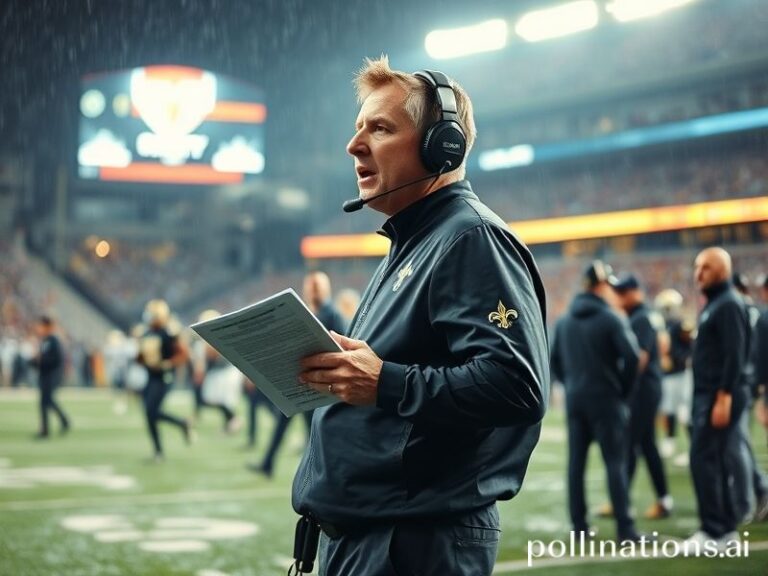pittsburgh steelers qb
Steelers Quarterback: The Oval-Office of a Rust-Belt Kingdom
By our man in the cheap seats, watching civilizations rise and fall between hot-dog commercials
Pittsburgh—population smaller than a Beijing subway car at rush hour—has again entrusted its collective serotonin levels to a 24-year-old from Oklahoma who still calls shopping malls “downtown.” Meet Russell Wilson 2.0, or perhaps Kenny Pickett 1.5, depending on which Steelers bar you stagger out of. The identity of the man under center matters less than the ritual: three rivers, six Super Bowls, and one interchangeable human sacrifice in shoulder pads. The world snickers, then quietly copies the model.
Globally, the Steelers’ QB is a case study in how the provinces outsource hope. From Lagos to Lahore, mayors study the Rooney family’s playbook the way central bankers study the Fed: keep the brand austere, the colors minimal, and the populace convinced that next year is pre-written in black and gold. In an age when nation-states can’t keep the lights on, a privately-owned sports franchise delivers 17 guaranteed festivals of light—plus playoffs if the gods smile and the offensive line holds. Bread? Circuses handles that now, thanks.
Overseas, the announcement of a new Steelers quarterback trends harder than most coups. When Pickett’s chin strap hit the turf last October, Twitter in Jakarta lit up with condolence emojis; Al-Jazeera ran a crawl beneath Syrian earthquake coverage. Why? Because the Steelers are the NFL’s most exportable parable: post-industrial wasteland resurrects itself through precise route-running. It’s the closest thing America has to a UNESCO heritage site that can also throw a 40-yard dime.
Diplomats notice. The U.S. State Department once floated the idea of sending the Terrible Towel on goodwill tours—“soft power you can shake.” Compared with F-35s, it’s cost-effective: $9.99 to manufacture, zero collateral damage, and it dries itself on the flight home. Meanwhile, Beijing’s Confucius Institutes teach Mandarin with Steelers clips subtitled in—nothing says “mutual understanding” like explaining why 70,000 people wave yellow rags at third-and-long.
The quarterback himself becomes a de-facto secretary of heartland affairs. When he quotes scripture in post-game, Vatican analysts parse the transcript for schismatic tendencies. When he dates a pop star, the British tabloids reorganize the royal succession. And when he underperforms, the local economy hemorrhages roughly the GDP of Tonga: bars offload surplus pierogis, tattoo parlors cancel appointments, and somewhere a Croatian teenager deletes his “Steelers QB1” Fortnite skin, muttering about the futility of idols.
Of course, the job security rivals that of a Bolivian finance minister. Since 2004 the Steelers have cycled through starters faster than Italy changes governments. Each exit prompts a micro-diaspora: jersey sales plummet in the Balkans, and counterfeit markets in Bangkok scramble sewing machines to stitch new names over old, recycling polyester like historians rewriting textbooks after a regime change. Sustainability, they call it.
The broader lesson? In a fragmented world, people crave a single narrative arc, even if it ends in overtime heartbreak. Climate summits dissolve into communiqués nobody reads; the Kyoto Protocol can’t scramble for 12 yards on 3rd-and-11. But a quarterback sneak—now there’s clarity: gain the line, spike the ball, commercial break, repeat. The planet may be on fire, but for three hours on Sunday the conflagration is conveniently confined to a 120-yard rectangle with instant replay.
Will the new guy deliver Pittsburgh an unprecedented seventh Lombardi? Probably not. History says he’ll be benched, traded, or canonized—sometimes all three in the same season. Yet the international order keeps tuning in, because the alternative is confronting the real scoreboard: melting ice caps, inflation, and those unread climate reports stacking up like incomplete passes.
So toast the next Steelers QB with whatever passes for whiskey in your timezone. He’ll be gone before the hangover, replaced by another avatar of hope wearing the same number, the same helmet, the same impossible burden. And somewhere on another continent, a child who can’t spell Pittsburgh will learn to spell “Roethlisberger” anyway—proof that nostalgia is the last supply chain America hasn’t outsourced.







